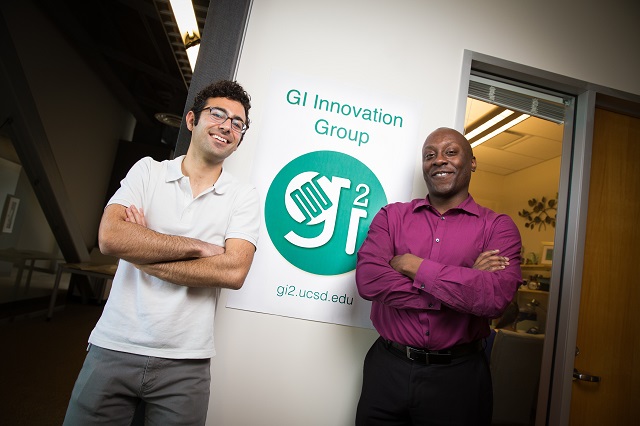UC San Diego’s ‘Proof-of-Concept’ Awards Move Campus Health Innovations to Market
Published Date
By:
- Kim McDonald
Share This:
Article Content
Nine teams of UC San Diego students, faculty and other researchers who have developed novel innovations that could improve various aspects of health care, have been awarded proof-of-concept awards designed to help bring their campus inventions to commercial use.
The pilot awards, which provide up to $50,000 in funding and commercial mentorship for all disciplines, were made possible through two programs operated by UC San Diego’s Institute for the Global Entrepreneur, and Office of Innovation and Commercialization.
Through the “Accelerating Innovations to Market,” or AIM, program, launched last year by the campus Office of Innovation and Commercialization, faculty and other researchers can apply for funding ranging from $10,000 to $50,000 for early-stage proof-of-concept and feasibility projects.
Through the Institute for the Global Entrepreneur (IGE) “Technology Accelerator” program, grants of up to $50,000 are available to Jacobs School of Engineering faculty, postdoctoral fellows and graduate teams.
The recipients for the awards were selected from 79 proposals received through a campus-wide call. Five awards were made by the AIM program, three by the IGE Technology Accelerator and one award was funded jointly by the two programs.
“Both of these programs ensure that more of the cutting-edge technologies developed on our campus quickly reach the patients and consumers who need them,” said Paul Roben, associate vice chancellor for innovation and commercialization. “Experts from the private sector help us to identify those technologies with the most market potential. We then help these programs bridge the gap with the market by providing targeted funding to help them reach the next commercial milestone.”
“We’re creating a roadmap for acceleration, working with the Office of Innovation and Commercialization to streamline and expand our commercialization efforts,” said Dennis Abremski, executive director of the Institute for the Global Entrepreneur, a collaborative effort between the Jacobs School of Engineering and the Rady School of Management.
By coordinating efforts, IGE and OIC hope to make it easier for someone to go from lab to market, or from federal grant to commercial investment.
“Our mission is to educate and prepare the next generation of C-level entrepreneurs, and accelerate innovations,” Abremski said. “This collaboration demonstrates our commitment to working with partners to help us achieve both of these goals.”
The new awards will support the following research teams in bioengineering, cardiology, gastroenterology, global health, medicine, neurosciences, orthopedic surgery and radiology:
Accelerating Innovations to Market (AIM) Program
- Hacking Gaze Behavior to Improve Attention in Young Children with Autism Leanne Chukoskie, assistant research scientist, Qualcomm Institute and Institute for Neural Computation; and Jeanne Townsend, adjunct professor emeritus of neurosciences
- Designer Molecular Probes for Assessing Atherosclerotic Plaque Rupture Vulnerability Calvin Hang, postdoctoral fellow in cardiology and Neil Chi, associate professor of cardiology
- Novel Air/Water Retention Device for Improved Visibility in Colonoscopies Denise Kalmaz, associate clinical professor of gastroenterology
- Big Data-based Social Surveillance Security Platform to Detect and Report Illicit Online Sales of Drugs Timothy Mackey, associate adjunct professor, Global Health Program
- MRI Quality and Guidance System Albert Hsiao, assistant professor of radiology
Institute for the Global Entrepreneur (IGE) Technology Acceleration Program
- Optimization of Systems and Methods for Non-invasive Gastric Monitoring (Joint award with AIM program) Armen Gharibans, postdoctoral fellow in bioengineering; and Todd Coleman, professor of bioengineering
- Novel Treatment to Safely Reduce Intracranial Pressure Lonnie Petersen, postdoctoral fellow, orthopedic surgery; Alan Hargens, professor of orthopedic surgery; and Jeffrey Steinberg, resident physician
- A Smarter Pain Therapy for a Critical Time in Healthcare Akshay Paul and Ana Moreno, graduate students in bioengineering
- Prediction of Clinical Response to Cardiac Resynchronization Therapy Jeffrey Omens, professor of medicine; and Ryan Fishel, graduate student in bioengineering
Share This:
You May Also Like
Stay in the Know
Keep up with all the latest from UC San Diego. Subscribe to the newsletter today.




